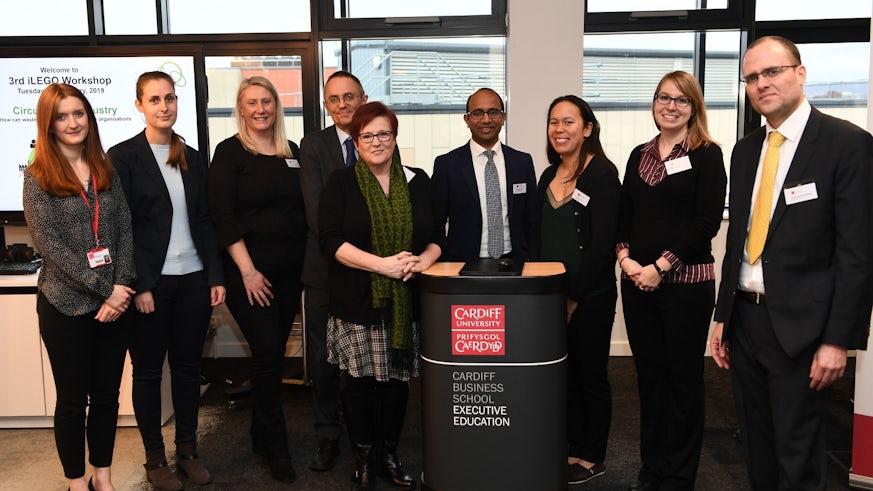Circularity in industry
20 March 2019

Practitioners from industry and academia have shared knowledge and expertise on waste valorisation at the third Innovation in Lean Enterprise and Green Operations (iLEGO) conference on 15 January 2019.
The event, hosted by Cardiff Business School and organised by Professor Maneesh Kumar, Dr Vasco Rodrigues and Nadine Leder, put recycling, reuse, composting and conversion at the heart of a series of presentations from government, private, public and third sector speakers.
The implementation of waste valorisation business models has grown in response to the grand challenges posed by climate change, pollution and resource poverty.
Practises like recycling, reuse, composting and conversion offer ways in which organisations might ‘close the loop’ and ensure that waste is limited by creating circularity within supply chains.
Circular economy in Wales

The event’s first speaker, Dr Andy Rees OBE, Head of Waste Strategy for the Welsh Government, outlined how policy is being developed and delivered for a more resource efficient, one-planet, circular economy in Wales.
Dr Rees showed how the nation boasts an impressive recycling rate, but aims to do more through consultation on policy initiatives to deliver social and economic benefits in line with the objectives of the Well-Being of Future Generations (Wales) Act 2015.
Technology is key

Lauren Ing, Director of Sustainability Strategy at Accenture Strategy, was next to speak and wasted no time in championing the need for creating a systems-based, holistic approach to the Circular Economy.
Ms Ing forwarded the view that technology is key to enabling this transition.
Next up, Suzanne Westlake, Head of Corporate Responsibility and Corporate Affairs at Ocado, gave a retailer’s perspective on the UN’s Sustainable Development Goals.
Innovative solutions

Ms Westlake showcased Ocado’s successes demonstrating how the retailer produces only 0.025% food waste against an industry average of 3%. They achieve this through a variety of measures, including donation of waste to food banks.
Ocado’s biggest environmental impact is from its fleet and fuel use. Ms Westlake explained that this is an area in which they are continually seeking innovative solutions in order to reduce their footprint.
To date, they have implemented route optimisation initiatives, light-weighted their delivery vehicles and sought alternative vehicle fuels.
In focus

Lunch was followed by a series of focus groups led by event organisers, Professor Maneesh Kumar, Chair in Service Operations, Dr Vasco Rodrigues, Senior Lecturer in Logistics and Operations Management and Nadine Leder, a research student, all from Cardiff Business School.
Delegates discussed the internal and external challenges organisations encounter when implementing waste valorisation business models and how technology might help to overcome these.

The outcomes of the focus groups are set to be published as part of Ms Leder’s PhD thesis with communications, data collection and use, disassembly and AI among the considerations raised.
A revolutionary piece of legislation
The focus groups were followed by a keynote lecture from Sophie Howe, Future Generations Commissioner for Wales.
Ms Howe outlined the details of the Well-being of Future Generations (Wales) Act 2015, a revolutionary piece of legislation, which gives Wales the ambition, permission and legal obligation to improve our social, cultural, environmental and economic well-being in Wales
The commissioner explained how the Act implore public bodies in Wales to think about the long-term impact of their decisions, to work better with people, communities and each other, and to prevent persistent problems such as poverty, health inequalities and climate change.

Ms Howe’s work has attracted interest from countries across the world because of its ambition to make long-lasting and positive change to current and future generations.
The penultimate presentations of the day were delivered by Nerys Williams, Facilities Development Manager at Swansea City Council and Simon Jones, Commercial Director at Ministry of Furniture.
A collaborative journey

Ms Williams and Mr Jones shared the outcomes of Ministry of Furniture’s circular economy project with Swansea City Council which saw the wholesaler upcycle and remanufacture old furniture for redesigned Council offices.
By avoiding procurement of new furniture, the Council were able to reduce office space by 50% (six thousand square meters) at their County Headquarters and introduce ‘agile working’ to improve staff well-being and working conditions.
Tina Schmieder-Gaite, Project Manager and Susan Jay, Sector Specialist Circular Economy, both from WRAP Cymru, brought proceedings to a close.
Ms Schmieder-Gaite outlined WRAP’s valorisation programme.
She explained how the company has developed an extensive suite of free resources for businesses interested in benefiting from valorisation.
Resources include a business case toolkit and a mapping tool to identify wastes and by-products and the stages at which they are generated through the manufacturing process.
Ms Jay covered WRAP’s work on plastics value chain.

Their Plastic Route Map was highlighted, as was the UK Plastics Pact, a collaborative initiative aimed at creating a circular economy for plastics bringing together businesses, government and NGOs to tackle the scourge of plastic waste.
iLEGO 2019 was sponsored by Cardiff University’s Co-Growth Project, a three-year project which aims to facilitate co-operation across the Welsh drinks sector through the application of cluster-based research.
iLEGO is an annual conference and part of a wider initiative which undertakes applied research, including co-funded company-based PhD and Knowledge Transfer Projects and summer internships for university graduates.
Share this story
A joint industry-University initiative that aims to achieve high quality research with impact in the fields of logistics and manufacturing management.




